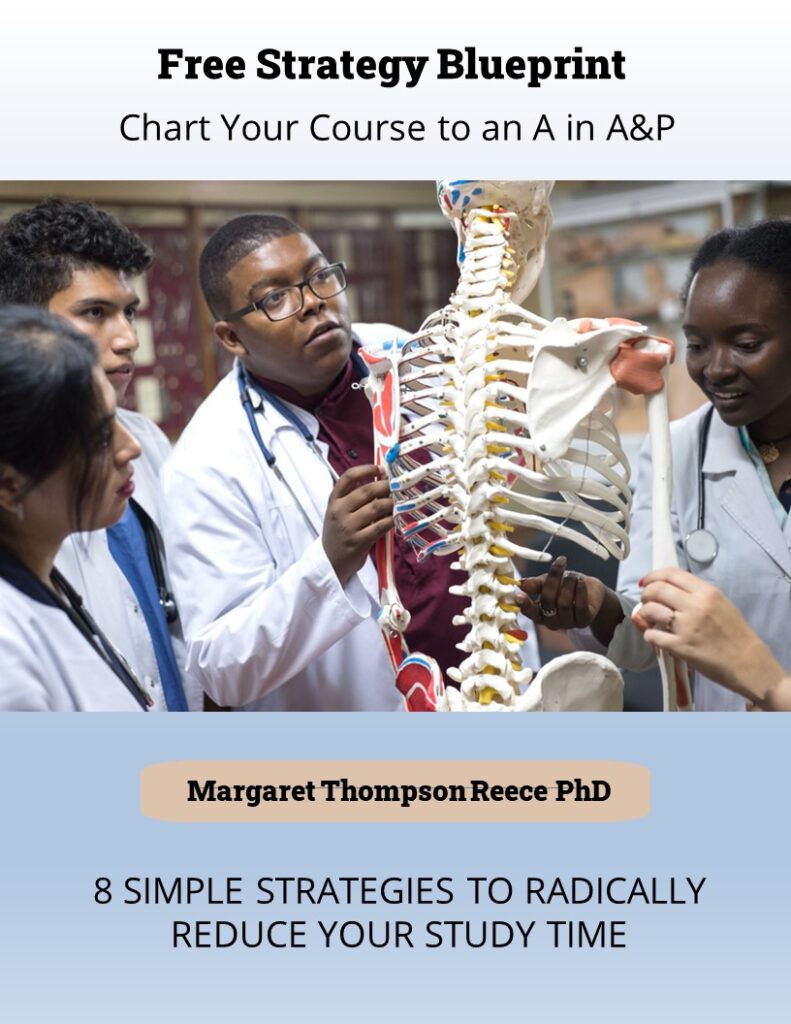10 Tips for How to Learn Anatomy & Physiology
Is Anatomy & Physiology Ruining Your GPA?
Getting organized in A&P
1) Read your course syllabus carefully. Keep a copy of it handy throughout the semester. There is a lot of important information there that will make much more sense to you as the course proceeds – information that you will not remember if you do not keep it handy.
For more details about what to look for in your syllabus click on “What Syllabus for Anatomy and Physiology?”
2) Organize your study plan. Research has shown that new information must be revisited over time for it to be securely stored in memory. In anatomy and physiology, new material comes at a rapid pace and students sometimes forget to review past material often enough. To help you solve that problem I suggest using a journal to schedule your study of A&P.
You can find advice on how to do this by reading “Study Anatomy and Physiology for Maximum Learning”.
3) After the first or second lecture in your course, show your class notes to your instructor. Ask if you have captured the major points. If not, ask your instructor for help in figuring out how to take better notes. Listen carefully to what you are told – even if you do not agree. Repeat back to your instructor what you think you heard to confirm that you got it correctly.
You will find more about taking good class notes at “Note Taking Skills”.
4) Do not let what you think you know about anatomy and physiology get in the way of the concepts your instructor is teaching. Living in a connected modern world, you already have information in your brain about human anatomy and physiology. Some of it may be very accurate information. Some of it may have given you false impressions.
Consider what you think you already know and cross check your facts with your textbook – not Google. You will be tested for knowledge as it is presented in your anatomy and physiology textbook.
For more information about how to do this read “Memory and New Learning”
Tips for Studying Anatomy
5) The first thing to do is to focus upon the words that describe orientation and direction in space of body parts.
Be particularly careful not to confuse right and left. Our use of computers has taught us some habits. We right and left justify material on the computer screen without thinking much about it – the reference always being our own right and left side. However, in anatomy you need to always think in terms of the specimen’s right and left side.
For more about the importance of the terms describing human body orientation read “Orientation in Anatomy“. Click here.
6) Listen to yourself correctly pronouncing anatomical names. Most brain structures dedicated to processing of auditory signals are superb at discerning pitch of the human voice and assigning meaning to it.
If English is not your primary language and you are taking an anatomy and physiology course with an English speaking instructor, Google has a great free website to help you at translate.google.com. There you can enter the scientific term from your anatomy and physiology textbook and then have it translated into virtually any language in the world.
Under each word is a microphone icon that you can click to hear the word in both languages. Practice saying the words and listen to your own voice. For more on this subject get the FREE first chapter of my new book “Inside the Closed World of the Brain.”
You may also find the posts “Repetition in Anatomical Names” helpful.
7) Break long anatomic names into smaller parts to extract meaning. Scientists love to make up long words from a combination of small words.
Originally the smaller words used in anatomy and physiology were Roman Latin and Greek terms. The foreign words named objects. Early anatomists established the practice of using the meaning of the Latin and Greek words to describe newly observed body parts.
For example, one small Greek word that means hollow vessel, cyte, is often used as the last part of the name of various cell types. The first part of the cell name describes the location or appearance of the cell. Examples include astrocytes that are shaped like stars, leukocytes that are white blood cells, melanocytes that are cell containing the pigment melanin, and osteocytes that are bone cells. The list of -cytes in anatomy is very long.
How anatomists string together descriptive words to name muscles is further described in “Human Body Muscles”.
Tips for Studying Physiology
8) Memorizing the facts of physiology often leads to poor exam grades. There is an easier way to master this science. Start by examining the way in which anatomic systems work together to maintain necessary set points, that is homeostasis. Details of this idea can be found at my post “3 Simple Secrets to Learning Physiology” by clicking here.
Work at understanding what is meant by homeostasis. Briefly, every aspect of physiology is directed toward the body’s maintenance of an optimal set of working conditions – blood volume, blood pressure, neutral blood pH, precise body fluid composition, and so forth. Physiologists call this process of keeping body conditions in the correct range maintaining homeostasis.
Maintaining homeostasis requires a network of Sensors that signal when a property of the system strays out of the desired range. Sensors send signals to Responders. Responders bring the system back to the desired condition. Individual sets of Sensors and Responders are called Feedback Loops.
Part of the process of homeostasis is the body’s ability to replace its parts. Check out the page titled “Physiology of Self Renewal” by clicking here.
9) The principle of physiological cause and effect is something instructors struggle to teach, and students struggle to learn. Yet, this concept forms the foundation of modern medical practice.
Cause is defined as a force that produces an effect. Physiological Cause may be a force from the environment, or something deviating from the norm within the body, that grossly disrupts homeostasis. For example, the disruption may be acquiring an infection, being chased by a tiger, being shot, experiencing a heart attack, or falling off a ladder.
Physiological Effect refers to the co-operative response of the body’s many feedback loops to neutralize the disruption in ways most likely to insure survival of the person. Examples of mechanisms underlying the physiological effect of trauma can be found by opening your computer browser and typing “physiological response to X” in the search box. Replace “X” with words such as alkalosis, or trauma, or heart attack, or threat and hit “enter”. Next you will see long descriptions of what is known about the response of the body’s multiple feedback loops to that insult.
There is no need to memorize the complex responses you find – for right now just observe how many systems become involved when homeostasis is disturbed by a large force.
An example of how cause and effect works can also be found at my post Buffering Body Alkalinity and Acidity. Click here.
10) Become aware that physiology is about communication between body compartments. And do not expect physiological compartments to have boundaries like rooms in a house. Physiological compartments are often amorphous – that is without structural anatomy.
The two largest compartments that control much of physiological chemistry are the extracellular fluid compartment and the intracellular fluid compartment. At first glance these two compartments appear quite boring. Do not be fooled by that. Much of physiology in each organ system is dictated by communication between the two major fluid compartments.
More details about the importance of communication between body compartments can be found on the pages Compartments in Anatomy and Physiology and Physiology and Biochemistry.
Bonus Tips
If you have read this far, you may also like to get my FREE A&P Strategy Blueprint and its attached e-course with many more tips on how to manage exams so that you score high. Get it now by clicking here.
I hope you find these study tips helpful. If you do, please share them with your friends on social media by clicking on one of the icons below. Best of luck in your study of Anatomy and Physiology.
Do you have questions?
Please put your questions in the comment box or send me an email at DrReece@MedicalScienceNavigator.com. I read and reply to all comments and email.
If you find these tips helpful, please share them with your fellow students or send it to your favorite social media by clicking one of the buttons below.
Margaret Thompson Reece PhD, physiologist, former Senior Scientist and Laboratory Director at academic medical centers in California, New York and Massachusetts is now Manager at Reece Biomedical Consulting LLC.
She taught physiology for over 30 years to undergraduate and graduate students, at two- and four-year colleges, in the classroom and in the research laboratory. Her books “Physiology: Custom-Designed Chemistry”, “Inside the Closed World of the Brain”, and her online course “30-Day Challenge: Craft Your Plan for Learning Physiology”, and “Busy Student’s Anatomy & Physiology Study Journal” are created for those planning a career in healthcare. More about her books is available at https://www.amazon.com/author/margaretreece. You may contact Dr. Reece at DrReece@MedicalScienceNavigator.com, or on LinkedIn.
Dr. Reece offers a free 30 minute “how-to-get-started” phone conference to students struggling with human anatomy and physiology. Schedule an appointment by email at DrReece@MedicalScienceNavigator.com.




veeeeeeeeeeeeeeery,veeeeeeeeeeeeeeeeeeeeery nice.
actually its helpfull
Great tips! I am taking an accelerated course in A&P I. It helps to have your syllabus handy. It’s basically a step above the instructor since you’ll known what and when to read up on.
Hi Kara. I am glad you are keeping your syllabus handy. It really does help schedule a student’s time.
Dear Dr.Reece,
i understood your most important notes. Sometime I read the whole day but when I attend the class nothing turn on my mind. now it’s a bit Ok.
Thanks.
James
First timer for me learning A&P for sure i will take on these tips. Nerves are kickn in!!!!
Thank you!!! I appreciate what you’ve done here so very, very much!
….its very good idea i lyked it from HMC
The tip about showing notes to the professor was so brilliant! Because there’s just so much material to go through and he doesn’t cover everything so getting a feel for what he really wants us to know is probably the most important. Thanks so much for this post, it really helped.
I really appriciate wat u hv done and i,m encouraging u to do moreeeeeeeee.
I appreciate you taking the time to give so many great resources to those of us aiming to get as much out of our A & P course(s) as possible.
I’m very confident about my comprehension of anatomy so far, but my physiology textbook assumes I have a background in chemistry. I’m going to try and find a crash course in the basics so that I better understand the chemical makeup, and not just memorize them to pass my exams.
Again, thank you so much!
Betsey
Hello Betsey. Many students have trouble with the chemistry of physiology. That is why I wrote the book “Physiology: Custom-Designed Chemistry” [https://booklaunch.io/mr-2907/551054c79becfd440f47b45e] This short book has all the chemistry you need to get off to a good start in physiology. If you have a Prime account at Amazon you can read the Kindle version for free. Best wishes for great success with your course in A&P.
Good suggestions but i am having difficulty in understanding concepts. Help me!
Tell where you are stuck. Is it a particular system that is a problem?
Good suggestion but i having difficulty in understanding in anatomy plzz clear my concept plzz help me…..
shubham agrawal please send me an email at DrReece@MedicalScienceNavigator.com and tell me more about your problem with anatomy. I will be able to offer you better help through email.
I have difficulty in understanding and interrelating the concepts in physiology much of the time i feel difficult to answer my professor question so guide me the way to approach the subject
I am not sure where you are in your physiology course right now. Send me an email at DrReece@MedicalScienceNavigator.com and we can discuss where you are having specific problems more fully. In general, physiology is regulated by 3 master control systems that interact with each other – the nervous system, the cardiovascular system and the endocrine system. When something changes in one of these master systems the other two must respond in some way because they are tightly linked with one another. This makes physiology harder to study than anatomy where each system such as bones and muscles is studied separately.
very good nice mrs
hi dr reese i have the hardest time remembering the name on any structures do you have any easy way or any ideas.
The names are all Latin and Greek derivatives. Look up the word in a collegiate dictionary. It will tell you the original meaning of the root words and help you translate them into something you find familiar. Also try translate.google.com for the pronunciation. It is easier to remember words you can pronounce. Best of luck with you studies.
Hi! Great article! I also found a page that was very helpful for me when learning anatomy – https://practiceanatomy.com/
Give it a try, I hope it will help!
Good luck with exams and anatomy!
Thanks for the link. I will check it out.
Ma’m, I m preparing for my final exams in anatomy, physiology and biochemistry. The course is so vast and such an headache. please figure me out to help me out in my last minute preparations
That is a lot to be studying all at once. My suggestions are: for anatomy study the largest muscles well including their nerves and blood vessels, for biochemistry focus on the metabolic pathways for glucose, aerobic and anaerobic, and for lipids including the citric acid cycle, for physiology remember everything depends upon the interaction of the 3 master controllers, nervous, cardiovascular and endocrine system. Each organ system has some sort of regulation by the nervous system, the cardiovascular system and the endocrine system. Nervous effects will be very fast, cardiovascular moment to moment and endocrine effects will be long term. Review system by system and think about how each master controller contributes to its function. Best of luck with your studies and exams. Please write again to tell me how it goes.
I’m a beginner in medical school and the tips were very helpful because i was feeling pressured and i didn’t know where to start.I’ll definately share this with my friends.
Tremendous issues here. I am very glad to look your post. Thanks a lot and
I’m having a look forward to contact you. Will you please drop me a e-mail?I will
let this here: https://finalsgradecalculator.com Thank you!
Hi Dr. Reece. Thank you for your generous tips. Do you have any resource recommendations for a pre-A&P crash course? I just found out I need to take a year-long series starting in 3 weeks and haven’t taken it in nearly a decade (and this will be a more in-depth and rigorous course). What can I do to prepare? Thank you for any help you can provide.
Lauren you can find my free strategy blueprint for A&P at https://www.medicalsciencenavigator.com/OptimizedPress/apoptin/. It comes with a free email course over 3 weeks with information about how to approach exams and links to other helpful material I have found on the web. Because physiology taught in an order that follows the best way to teach anatomy in A&P courses, it is difficult for students. I offer an online course 30-Day Challenge: Craft Your Plan for Learning Physiology where students learn how human physiology is organized and how to best learn it in an A&P course setting. You can find more about that at https://www.medicalsciencenavigator.com/OptimizedPress/physiologyhelp.
Hello I’m currently taking A&P and I feel like i don’t know anything. can you give me any ideas on how to study to pass this class please.
Do not try to learn everything in your textbook. Follow you instructor’s lead. If there is a lecture on a topic, read about that topic in your text. If you do not get the idea, go to your instructor’s office hours for help. Teacher’s test what they talk about with students. If you can form a study group with other students, that is always a big help. It gives you a chance to hear the material you are reading as you try to explain it to each other. The brain remembers better what it hears than what it reads. Good luck. Send me an email if you get stuck at DrReece@MedicalScienceNavigator.com.
This is very helpful, thank you. Will sure try this the group as well.
Very helpful information!!! Thank you
Well, after going through all these tips, I have hope that I can actually learn and understand A&P if I follow the ten tips to learn Anatomy and 3 secrets to learn Physiology. I can tell I will need alot of help yes.
What you need most is time to review on a regular basis. The information is broken down into lectures but it is all linked. Take a few minutes each day to go back over notes from previous lectures and the whole picture will come together by the end of the course.
i need help with biology explain how you will carry out a study on the physiology and anatomy of a named animal
First you need a testable hypothesis. Then it depends upon the animal proposed, where the animal is housed (research laboratory or zoo), the kind of research facilities available and rules in place.
Pingback:anatomy and physiology for beginners - logindataworld